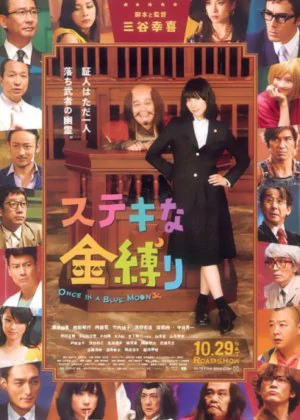Once in a Blue Moon
Movie details

Most Japanese comedies tend to be either extremely over the top (Milocrorze, Donju) or extremely dry and deadpan (Blessing Bell). Once in a Blue Moon [Sutekina Kanashibari] aims for a more balanced combination of these two stretches and somehow gets away with it. The result is a witty, sparkling, amusing and at times slightly disturbing film that charms like there's no tomorrow.

After watching Miike's Ace Attorney earlier, Sutekina Kanashibari marks the second oddball court comedy I've seen this year. Even though both film have quite a lot in common, Mitani doesn't share Miike's anime/manga aesthetics and chases a different kind of funny. While still extremely rooted in Japanese culture, the comedy here is a lot warmer and aims to charm rather than go full-force for freaking people out.
Sutekina Kanashibari is characterized by a unique "laissez-faire" style of humor. All said and done there is plenty of weird stuff happening throughout the film, but somehow the characters are quick to accept these oddities, acting either mildly amused or severely interested in whatever they are told to believe. Because of that, it's much easier to go along with the weird story twists, which makes for a very different experience compared to other Japanese comedies.
The film follows the adventures of Emi Hosho, a failed lawyer who is just given her very last chance to prove her worth. It's a tricky case she's handling though, as the defendant's only alibi is a wandering ghost who held him hostage on the moment of his wife's murder. Realizing the ghost is her only chance of winning the case, Emi drags him along to court. While the judges don't seem to mind the appearance of a ghost as a witness, the plaintiff is eager to do everything in his might to invalidate Emi's case.

While not overly flashy or in your face, Sutekina Kanashibari is a very pleasant film to look at. It's a very colorful and delicately shot film that doesn't really experiment but still manages to one-up its competitors with some fancy camera tricks and smart visual touch-ups. There's even some CG and while not truly remarkable, these scenes are not just some cheaply tagged on computer animation inserts either.
The soundtrack is cute and often resembles that of classic cartoons. It's a collection of up-tempo, light-hearted music with some funny accents left and right that compliment the comedy moments on screen. It's not a very recognizable or unique score, I can't really imagine listening to it as a standalone piece of music, but within the film it definitely does the job and it enhances the already solid atmosphere, which in the end is all that truly matters.
If there is one stand-out performance in Sutekina Kanashibari it's Toshiyuki Nishida's role as the wandering ghost warrior. He is great as the gullible but slightly mischievous ghost with a golden heart. The rest of the cast is basically there to support him (Eri Fukatsu) or to provide some unrelated comedic relief (Tadanobu Asano). Hiroshi Abe puts in a commendable performance and Dolls fans are sure to recognize Kyoko Fukada in a small but important role. But my favorite character here is without a doubt the judge, who kickstarts most of the stand-out funny moments.

Even though the film lasts a whopping 140 minutes (which is stretching it with the material at hand), the film never drags or wears thin. The comedy remains at a constant level throughout the film, there's no change of tone to allow for a more serious and/or dramatic ending and there are still plenty of quality laughs during the final hour. There may not be too many laugh out loud scenes, but you're sure to spend the majority of the running length with a contented smile on your face, eagerly waiting to see whatever happens next.
The combination of strange plot twists and original turn of events with a warm but deadpan sense of humor is the true winner here. The rest of the film is tailored to maintain this tricky balance and Mitani handles it like a pro. There are no notable dips, no boring subplots or sentimental pressure to take away from the overall charming atmosphere. To be honest, I didn't expect too much when I sat down to watch this film, but it turns out to be one of those films that I would even recommend to people who're not really into Japanese cinema.